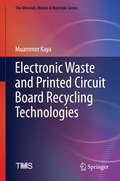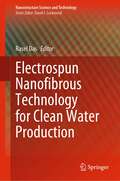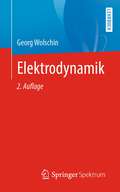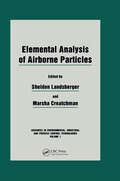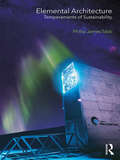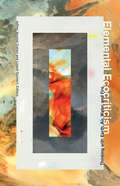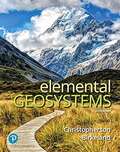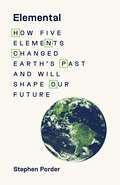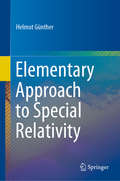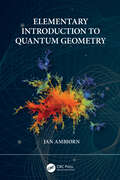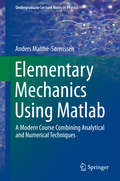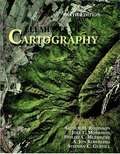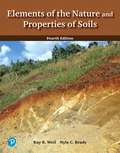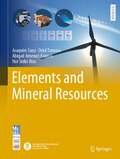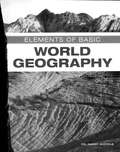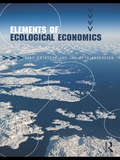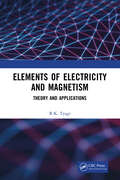- Table View
- List View
Electronic Waste and Printed Circuit Board Recycling Technologies (The Minerals, Metals & Materials Series)
by Muammer KayaThis book covers state-of-the-art technologies, principles, methods and industrial applications of electronic waste (e-waste) and waste PCB (WPCB) recycling. It focuses on cutting-edge mechanical separation processes and pyro- and hydro-metallurgical treatment methods. De-soldering, selective dismantling, and dry separation methods (including the use of gravity, magnetic and electrostatic techniques) are discussed in detail, noting the patents related to each. The volume discusses the available industrial equipment and plant flowsheets used for WPCB recycling in detail, while addressing potential future directions of the field. This practical, comprehensive, and multidisciplinary reference will appeal to professionals throughout global industrial, academic and government institutions interested in addressing the growing problem of e-waste. Covers principles, methods and industrial applications of e-waste and PCB recycling;Details state-of-the-art mechanical separation processes and pyro- and hydro-metallurgical treatment methods; Describes the available industrial equipment used and plant flowsheets for PCB recycling and addresses potential future developments of this important field.
Electronic, Magnetic, and Thermoelectric Properties of Spinel Ferrite Systems: A Monte Carlo Study, Mean-Field Theory, High-Temperature Series Expansions, and Ab-Initio Calculations (SpringerBriefs in Materials)
by Rachid MasrourThis book explores magnetic properties and critical temperatures in inverse ferrite Fe₃⁺(M₂⁺Fe₃⁺)O₄ spinels (e.g., Fe, Co, Ni). It calculates transition and Curie Weiss temperatures, providing insights into their thermodynamic behavior. Using the full potential linearized augmented plane wave (FP-LAPW) method, it investigates electrical and magnetic structures of spinel chromite, revealing magnetic moments in MnCr₂S₄. Seebeck coefficient and electrical conductivity are also calculated. Advanced techniques like Monte Carlo, DFT+U, and FLAPW analyze magnetic characteristics of LiMn₁.₅Ni₀.₅O₄ and electronic/magnetic structures of Fe₃O₄. High-temperature series expansions calculate Néel temperature and critical exponents, while GFT determines thermal magnetization and susceptibility. The analysis exposes exchange interactions' effects on magnetic order and introduces asymmetric phases in ferrimagnetic spinel systems. This book serves as an invaluable resource for researchers, academics, and enthusiasts seeking a comprehensive understanding of magnetic properties and critical phenomena within diverse spinel materials.
Electronics for Physicists: An Introduction (Undergraduate Lecture Notes in Physics)
by Bryan H. SuitsThis book provides undergraduate physics majors and students of related sciences with a sound basic understanding of electronics and how it is used, principally in the physical sciences. While today few science students go on to careers that demand an ability to design and build electronic circuits, many will use and rely on electronics. As scientists, they will require an appropriate level of fundamental knowledge that enables them, for example, to understand what electronic equipment is doing, to correctly interpret the measurements obtained, and to appreciate the numerous links between electronics and how it is practiced, and other areas of science. Discussing electronics in the broader context and from the point of view of the scientist, this book is intended for students who are not planning to become electronics specialists. It has been written in a relatively informal, personal style and includes detailed examples, as well as some “outside the box” material to inspire thought and creativity. A selection of relevant exercises is included at the end of each chapter.
Electrospun Nanofibrous Technology for Clean Water Production (Nanostructure Science and Technology)
by Rasel DasThis book covers the remarkable progress in the field of electrospun nanofibrous materials synthesis that has been made in recent years for clean water production. The goal is to offer comprehensive and substantial contents in each chapter, entailing the electrospinning principle, novel materials and methods, properties, characterization, and applications, such as adsorption, catalysis, and membranes. The book is instrumental in terms of showing the scale-up production of desired fibers that ensure the control of the structure–properties relationship for developing effective water treatment technologies. Every chapter ends with a special section for highlighting research challenges and breakthroughs, so that scientists can explore these opportunities and discover new directions for future developments. Material scientists, nanotechnologists, chemists, engineers, water specialists, and environmentalists will be inspired by the information on electrospun nanofibrous materials to be found in the book. The wide variety of new ideas and recommended future reading will encourage early-career scientists working in this field to design new experiments and practices. The book is useful for college and university-level students enrolled in project courses in materials science and related fields.
Electrostatics and Magnetostatics
by Reiner M. Dreizler Cora S. LüddeThis textbook offers you a profound understanding of the core concepts in electrostatics and magnetostatics. Emphasis is placed on establishing strong mathematical fundamentals while also equipping you with problem-solving skills crucial for mastering these disciplines. It covers basic equations of electrostatics and solution of the Poisson equation as well as Magnetostatics.
Elektrodynamik
by Georg WolschinDieses Buch umfasst ausgewählten Vorlesungsstoff der Theoretischen Physik: Elektrodynamik für Studierende im Grundstudium. Nach einer Einführung in die Grundbegriffe und die Maxwell’schen Gleichungen folgen Kapitel über Elektrostatik und Magnetostatik. Anschließend wird die spezielle Relativitätstheorie als Konsequenz der Lorentz-invarianten Maxwell-Theorie vorgestellt, so dass im folgenden Kapitel die vierdimensionale Formulierung der Elektrodynamik mit Feldstärketensor, Energie-Impuls-Tensor sowie die Lagrange-Formulierung eingeführt werden kann. Elektromagnetische Wellen werden im Vakuum und in Materie untersucht, sowie Wellenpakete und die Reflexion und Brechung an Grenzflächen studiert. Die Felder bewegter Ladungen, die zugehörigen Liénard-Wiechert Potenziale für bewegte Punktladungen und die Larmor-Formel leiten über zum Hertz’schen Dipol. Die durch den schwingenden Dipol erzeugten Felder folgen hier aus den zeitabhängigen Potenzialen.Anhand von insgesamt über 40 Testaufgaben mit Lösungen am Ende der Kapitel wird der Leser dazu motiviert, den Stoff selbst beispielhaft nachzurechnen und das Gelernte zu festigen.
Elektrodynamik: Von den Maxwell-Gleichungen über die Elektro- und Magnetostatik zur elektromagnetischen Induktion (essentials)
by Hans Dieter Dahmen Siegmund Brandt Claus Grupen Tilo StrohDieses essential konzentriert sich auf die Vermittlung der wichtigsten Grundbegriffe, von der Elektrostatik, den Phänomenen des elektrischen Stromes bis hin zu den Maxwell-Gleichungen und aus ihnen abgeleiteten Erkenntnissen. Begriffe wie Ladung, Coulomb-Kraft, Dipol, elektrisches Feld und Potential, magnetisches Feld, Lorentz-Kraft und die Wechselbeziehungen zwischen elektrischen und magnetischen Feldern wie die Induktion werden dargestellt. Auf die vielen Anwendungen der Elektrodynamik wird hingewiesen.
Elektromagnetische Feldtheorie für Fortgeschrittene: Tensoranalysis, spezielle Relativitätstheorie und kovariante Formulierung der Maxwellgleichungen
by Harald KlingbeilDieses Buch bietet einen behutsamen Einstieg in die Tensoranalysis, in die Grundlagen der speziellen Relativitätstheorie und in die relativistische Formulierung der Elektrodynamik. Die Maxwell’schen Gleichungen im Vakuum und die kovariante Form der Maxwellgleichungen werden intensiv behandelt. Auch Dipole und die Abstrahlung elektromagnetischer Wellen bilden inhaltliche Schwerpunkte.Mathematisch präzise und durch ausführliche Rechnungen leicht verständlich, stellt das Buch eine Verbindung zwischen Elektrotechnik, Mathematik und Physik her. Für diesen Vertiefungsband ist ein Grundwissen der Elektrodynamik hilfreich, wie es im Band „Grundlagen der elektromagnetischen Feldtheorie — Maxwellgleichungen, Lösungsmethoden und Anwendungen“ des Autors oder vergleichbaren Lehrbüchern vermittelt wird.Übungsaufgaben mit ausführlichen Musterlösungen vertiefen den Stoff und helfen bei der Kontrolle des Lernerfolgs. Ein umfangreicher Tabellenteil am Ende des Buchs erlaubt die Nutzung als Nachschlagewerk.
Elektromagnetische Feldtheorie für Fortgeschrittene: Tensoranalysis, spezielle Relativitätstheorie und kovariante Formulierung der Maxwellgleichungen
by Harald KlingbeilDieses Buch bietet einen behutsamen Einstieg in die Tensoranalysis, in die Grundlagen der speziellen Relativitätstheorie und in die relativistische Formulierung der Elektrodynamik. Die Maxwell’schen Gleichungen im Vakuum und die kovariante Form der Maxwellgleichungen werden intensiv behandelt. Auch Dipole und die Abstrahlung elektromagnetischer Wellen bilden inhaltliche Schwerpunkte.Mathematisch präzise und durch ausführliche Rechnungen leicht verständlich, stellt das Buch eine Verbindung zwischen Elektrotechnik, Mathematik und Physik her. Für diesen Vertiefungsband ist ein Grundwissen der Elektrodynamik hilfreich, wie es im Band „Grundlagen der elektromagnetischen Feldtheorie — Maxwellgleichungen, Lösungsmethoden und Anwendungen“ des Autors oder vergleichbaren Lehrbüchern vermittelt wird.Übungsaufgaben mit ausführlichen Musterlösungen vertiefen den Stoff und helfen bei der Kontrolle des Lernerfolgs. Ein umfangreicher Tabellenteil am Ende des Buchs erlaubt die Nutzung alsNachschlagewerk.In der vorliegenden vierten Auflage wurden zahlreiche Themen überarbeitet, neue hinzugefügt sowie an vielen Stellen kleinere Ergänzungen des Textes vorgenommen, um die Verständlichkeit weiter zu erhöhen und die Darstellung zu vervollständigen.
Elektropneumatische und elektrohydraulische Bauelemente in der Mechatronik: Konstruktion von sicherheitsgerichteten Steuerungen für Industrie 4.0
by Herbert BernsteinMit der Entwicklung technischer Produkte sind die Anforderungen an die Industrie 4.0 besonders hoch. Dieses Lehrbuch liefert einen Überblick über die mechanischen und elektrischen Bauelemente, die in elektrohydraulischen und -pneumatischen Maschinen und Anlagen zum Einsatz kommen. Zudem wird auf die elektrische Sicherheitstechnik eingegangen. Ein Einstieg in speicherprogrammierbare Steuerungen und in die dahinterstehende Logik runden das Buch ab. Der elektronische, informationstechnische, mechanische, pneumatische und hydraulische Entwickler erhält somit eine Übersicht für sein praktisches Arbeiten.Die Zielgruppen:Ingenieure, Techniker, Meister und alle, die sich in die Mechatronik einarbeiten müssen Studierende technischer Fachrichtungen.
Elemental Analysis of Airborne Particles
by Sheldon Landsberger Marsha CreatchmanAn increased standard of living in developed and developing countries has brought about a distinct rise in pollution. The problem of air pollution has specifically increased the public's awareness of the environmental and health-related consequences resulting from modern day industrial technology. This detailed collection of works devoted to the most popular methods in elemental analysis of airborne particles offers investigators a comprehensive book on the most common laboratory analytical methods currently used in trace element analysis. Discussed are atomic absorption spectrometry, inductively coupled plasma, atomic emission, particle induced gamma ray analysis, particle elastic scattering and Rutherford backscattering, and neutron activation analysis. Specific sections on quality assurance/quality control and source receptor modeling have also been included.
Elemental Architecture: Temperaments of Sustainability
by Phillip James TabbElemental Architecture presents a new and refreshing approach to sustainable architectural practice. Going beyond the standard performance-based and quantitative sustainable measures, it incorporates a broader framework of considerations, including the more poetic and noetic possibilities of environmental design. The book is structured around the ancient Greek and medieval alchemists’ system of the Five Temperaments: fire, earth, air, water, and ether. Phillip James Tabb examines how these elements produce both positive and negative environmental forces which have an impact on architectural design – from drinking water and fresh air to torrential floods and tornados. He shows how responding to or enhancing these forces can help us to create a more sustainable, healthy, and purposeful architecture. To illustrate this, each chapter draws on seminal contemporary works of architecture, from Peter Zumthor’s Bruder-Klaus Field Chapel to Frank Lloyd Wright’s masterpiece at Fallingwater. These examples are accompanied by over a hundred high-quality illustrations. Expanding the discussion of sustainability to include phenomenological as well as qualitative considerations, Elemental Architecture is ideal for students and researchers with an interest in sustainable architecture and architectural theory.
Elemental Ecocriticism: Thinking with Earth, Air, Water, and Fire
by Jeffrey Jerome Cohen Lowell DuckertFor centuries it was believed that all matter was composed of four elements: earth, air, water, and fire in promiscuous combination, bound by love and pulled apart by strife. Elemental theory offered a mode of understanding materiality that did not center the cosmos around the human. Outgrown as a science, the elements are now what we build our houses against. Their renunciation has fostered only estrangement from the material world. The essays collected in Elemental Ecocriticism show how elemental materiality precipitates new engagements with the ecological. Here the classical elements reveal the vitality of supposedly inert substances (mud, water, earth, air), chemical processes (fire), and natural phenomena, as well as the promise in the abandoned and the unreal (ether, phlogiston, spontaneous generation). Decentering the human, this volume provides important correctives to the idea of the material world as mere resource. Three response essays meditate on the connections of this collaborative project to the framing of modern-day ecological concerns. A renewed intimacy with the elemental holds the potential of a more dynamic environmental ethics and the possibility of a reinvigorated materialism.
Elemental Geosystems
by Robert Christopherson Ginger Birkeland Charles Thomsen Stephen CunhaFor introductory physical geography courses. <p><p>Explore Earth’s dynamic, changing systems <p><p>Among the most highly regarded textbooks in physical geography, Robert Christopherson’s best-selling Elemental Geosystems retains its unparalleled currency, accuracy, rich integration of climate change science, and dynamic multimedia program. <p><p>Organized around the natural flow of energy, materials, and information, subjects are presented in the same sequence in which they occur in nature―an organic, holistic approach that is unique in this discipline. The 9th Edition features updated content and new Mastering Geography activities, while also incorporating new visual media, active learning activities, and visual tools to help student engagement and mastery.
Elemental: How Five Elements Changed Earth’s Past and Will Shape Our Future
by Stephen PorderAn ecologist explores how life itself shapes Earth using the elemental constituents we all shareIt is rare for life to change Earth, yet three organisms have profoundly transformed our planet over the long course of its history. Elemental reveals how microbes, plants, and people used the fundamental building blocks of life to alter the climate, and with it, the trajectory of life on Earth in the past, present, and future.Taking readers from the deep geologic past to our current era of human dominance, Stephen Porder focuses on five of life&’s essential elements—hydrogen, oxygen, carbon, nitrogen, and phosphorus. He describes how single-celled cyanobacteria and plants harnessed them to wildly proliferate across the oceans and the land, only to eventually precipitate environmental catastrophes. He then brings us to the present, and shows how these elements underpin the success of human civilization, and how their mismanagement threatens similarly catastrophic unintended consequences. But, Porder argues, if we can learn from our world-changing predecessors, we can construct a more sustainable future.Blending conversational storytelling with the latest science, Porder takes us deep into the Amazon, across fresh lava flows in Hawaii, and to the cornfields of the American Midwest to illuminate a potential path to sustainability, informed by the constraints imposed by life&’s essential elements and the four-billion-year history of life on Earth.
Elementary Approach to Special Relativity
by Helmut GüntherThis book presents an alternative representation of Einstein's Special Theory of Relativity, which makes Special Relativity much more comprehensible. Moreover, one will come across a fundamental relationship between the Special Theory of Relativity and the mechanics of space lattice. In all previous formulations, the Einsteinian special principle of relativity, in one or the other form is used as the starting point for Special Relativity. In correspondence to this principle, one takes it as granted apriori, that all observers independent of their uniform motion to each other measure one and the same propagation velocity of a light signal. This book is thought of as a lecture for physicists, mathematicians and computer scientists and concentrates on the students of these fields. The book should reach a broad circle of interested readers from the fields of natural sciences and philosophy and provide and invigorating experience for engineers.
Elementary Introduction to Quantum Geometry
by Jan AmbjornThis graduate textbook provides an introduction to quantum gravity, when spacetime is two-dimensional. The quantization of gravity is the main missing piece of theoretical physics, but in two dimensions it can be done explicitly with elementary mathematical tools, but it still has most of the conceptional riddles present in higher dimensional (not yet known) quantum gravity. It provides an introduction to a very interdisciplinary field, uniting physics (quantum geometry) and mathematics (combinatorics) in a non-technical way, requiring no prior knowledge of quantum field theory or general relativity. Using the path integral, the chapters provide self-contained descriptions of random walks, random trees and random surfaces as statistical systems where the free relativistic particle, the relativistic bosonic string and two-dimensional quantum gravity are obtained as scaling limits at phase transition points of these statistical systems. The geometric nature of the theories allows one to perform the path integral by counting geometries. In this way the quantization of geometry becomes closely linked to the mathematical fields of combinatorics and probability theory. By counting the geometries, it is shown that the two-dimensional quantum world is fractal at all scales unless one imposes restrictions on the geometries. It is also discussed in simple terms how quantum geometry and quantum matter can interact strongly and change the properties both of the geometries and of the matter systems. It requires only basic undergraduate knowledge of classical mechanics, statistical mechanics and quantum mechanics, as well as some basic knowledge of mathematics at undergraduate level. It will be an ideal textbook for graduate students in theoretical and statistical physics and mathematics studying quantum gravity and quantum geometry. Key features: Presents the first elementary introduction to quantum geometry Explores how to understand quantum geometry without prior knowledge beyond bachelor level physics and mathematics. Contains exercises, problems and solutions to supplement and enhance learning
Elementary Mechanics Using Matlab
by Anders Malthe-SørenssenThis book - specifically developed as a novel textbook on elementary classical mechanics - shows how analytical and numerical methods can be seamlessly integrated to solve physics problems. This approach allows students to solve more advanced and applied problems at an earlier stage and equips them to deal with real-world examples well beyond the typical special cases treated in standard textbooks. Another advantage of this approach is that students are brought closer to the way physics is actually discovered and applied, as they are introduced right from the start to a more exploratory way of understanding phenomena and of developing their physical concepts. While not a requirement, it is advantageous for the reader to have some prior knowledge of scientific programming with a scripting-type language. This edition of the book uses Matlab, and a chapter devoted to the basics of scientific programming with Matlab is included. A parallel edition using Python instead of Matlab is also available. Last but not least, each chapter is accompanied by an extensive set of course-tested exercises and solutions.
Elements Of Cartography
by Arthur H. Robinson Joel L. Morrison Phillip C. Muehrcke A Jon. Kimerling Stephen C. Guptill A. Jon KimerlingElements of Cartography, 6e continues its reputation as the market leader by integrating the latest in modern technology with traditional cartographic principles.
Elements Of The Nature And Properties Of Soils
by Raymond Weil Nyle BradyAt the forefront of soil science for over a century, Elements of the Nature and Properties of Soils considers the role of soils as both a natural resource and an ecosystem, while highlighting interactions between soils and other components of natural and constructed ecosystems. With practical value for meeting today’s environmental challenges, the text asserts that balancing economic growth with sustainable economies requires a deep understanding of soils. The 4th edition has been abridged to focus on fundamentals, while providing new or updated discussions on topics such as soils and human health, organic farming, and soil food-web ecology.
Elements and Mineral Resources (Springer Textbooks in Earth Sciences, Geography and Environment)
by Joaquim Sanz Oriol Tomasa Abigail Jimenez-Franco Nor Sidki-RiusThis textbook is the first to offer essential information on the ores and basic properties of the majority of chemical elements, together with the most important industrial minerals, their latest applications and recycling options, illustrated with a wealth of photos. This book represents the culmination of a comprehensive project jointly pursued by the Valentí Masachs Geology Museum and the Universitat Politècnica de Catalunya (UPC) (Polytechnic University of Catalonia) over the past several years. Published in response to multiple requests from university professors and other educators, it will promote a new society in which human beings use the Earth’s natural resources responsibly and with respect for the environment. Keep in mind that we aren’t the only inhabitants of the Earth, a wonderful but depletable planet!
Elements of Basic World Geography
by Nancy NicholsElements of Basic World Geography by Nancy Nichols
Elements of Classical and Quantum Integrable Systems (UNITEXT for Physics)
by Gleb ArutyunovIntegrable models have a fascinating history with many important discoveries that dates back to the famous Kepler problem of planetary motion. Nowadays it is well recognised that integrable systems play a ubiquitous role in many research areas ranging from quantum field theory, string theory, solvable models of statistical mechanics, black hole physics, quantum chaos and the AdS/CFT correspondence, to pure mathematics, such as representation theory, harmonic analysis, random matrix theory and complex geometry. Starting with the Liouville theorem and finite-dimensional integrable models, this book covers the basic concepts of integrability including elements of the modern geometric approach based on Poisson reduction, classical and quantum factorised scattering and various incarnations of the Bethe Ansatz. Applications of integrability methods are illustrated in vast detail on the concrete examples of the Calogero-Moser-Sutherland and Ruijsenaars-Schneider models, the Heisenberg spin chain and the one-dimensional Bose gas interacting via a delta-function potential. This book has intermediate and advanced topics with details to make them clearly comprehensible.
Elements of Ecological Economics
by Jan Otto Andersson Ralf ErikssonElements of Ecological Economics provides a comprehensive introduction to the field of ecological economics, an interdisciplinary project trying to give answers to the problems related to the overexploitation of the earth’s resources today. These include the problems of global warming (the greenhouse effect) and the overuse of the seas (e.g. overfishing). The book also gives an exposition of the closely related problems of global welfare and justice. The book covers topics including: the general policy perspective required by sustainability economic growth in a historical perspective sustainability conceptions and measurement within ecological economics economics and ethics of climate change global food security the state of the seas on earth and locally (the Baltic Sea). As an introductory-level text the book will be useful to undergraduate students taking basic courses in economics and related fields, and will be comprehensible to anyone interested in environmental problems. Through the separate chapters on the problems of climate change, sustainable food production, and the overuse of the seas, the reader will easily see the practical relevance to the theoretical concepts presented and used in the book.
Elements of Electricity and Magnetism: Theory and Applications
by R.K. TyagiThis book covers the theory, concepts, and applications associated with electricity and magnetism. It discusses various fundamental aspects including Coulomb’s Law, electric potential, capacitors, dielectrics, and paramagnetism. Aimed at undergraduate students with an elementary knowledge of mathematical analysis, it also includes solved problems at the end of each chapter for better understanding.The subject matter of this book also includes: The Biot-Savart Law RL Circuit Electromagnetic Wave Equation Displacement Current Equipotential Surfaces Print edition not for sale in South Asia (India, Sri Lanka, Nepal, Bangladesh, Pakistan or Bhutan)
